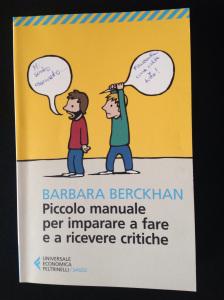October 14, 2015 · 3:53 pm

Is it necessary to criticise? Yes. Do not suppress an objective remark, unless:
- It refers to other people's affair (for instance, your think that your friends is too tanned);
- The remark would not change anything (for instance, if ther is little parking spaces around the work office)
- The issue is really silly.
In all other cases, better to talk than to... explode.
Suppressed criticism can lead to divorces, resignations, gossips, bad mood, depression, rage outbreaks.
The workplace is a very critical field. If you and your colleagues are constantly frustrated, if there is always a bad mood and if people do work with the only purpose to get the finish time, this means that in your company there is no sufficient feedback culture. In such situations, no matter how you ask for team spirit.
Remember this: positive feedbacks are often more effective than a wage increase. What we eagerly wish is appreciation, recognition. You can always find a positive and sincere feedbacks for someone. If this step is forgotten, if people is uttered only as incompetent and lazy, if the negative feedbacks is the only communication form, the cooperation level will fall under the shoes.
How to receive criticismTouchiness has a lot to do with own personality and past life. Each of us has its interior critic and cannot kill him, but you can learn to handle with criticism in a better way.
- First of all, instead of being unready, ask your frienda/partner/boss/colleague for a feedback. This will enable you to chose time and place and prepare yourself.
- Make questions. Ask the other person to specify wich of your actions has damaged or hurted him/her. This technique will also give you some more time to calm down (a very important part of the process of receiving criticisms)
- Listen. Without interrupting.
And at the end, remember: what you appreciate, grows.
Barbara Berckhan is a communication expert. She has studied pedagogy and psycology and since more than 20 years she held conferences and workshops in companies and organisations. One of her books is (my translation) Little Manual of verbal self-defence.
